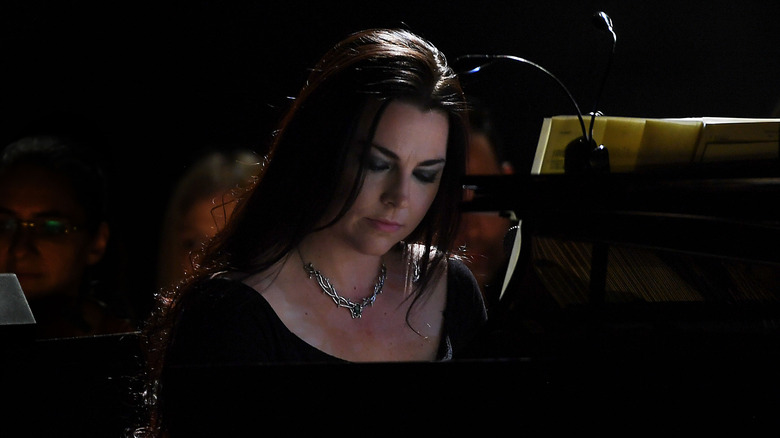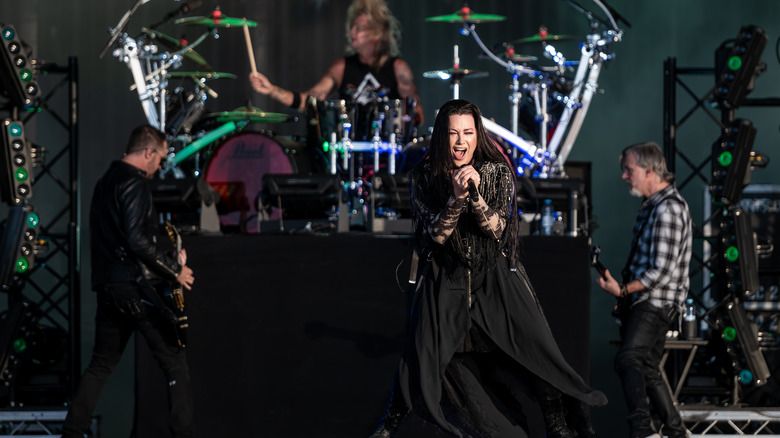The Most Tragic Losses That Changed Amy Lee
Amy Lee didn't dream of being a rock star as a young girl. Her earliest musical influences came from the classical world. She was fascinated by her grandmother's piano playing and the film "Amadeus," and she dreamed of one day being either a classical composer or scoring films, as she told Kerrang!. Even when she discovered grunge and heavy metal as a teenager and started down the path to becoming the leader of Evanescence, Lee made connections between heavy metal and the classical writers she knew.
Still, she made the transition into rock and grunge, though she didn't at first think of herself as a singer. Vocal performance was initially only an outlet for her poetry. For her poems, Lee drew on a darker muse than a classic film or her grandmother's talents. When she was only 6 years old, Lee's younger sister Bonnie died of an illness that left her physicians baffled. Lee was close to her sister and was devastated by losing her, but she didn't want to compound her parents' grief by showing her feelings. Poetry, and later music, became her outlet.
Lee carried that early sense of loss into her career with Evanescence. She's identified two songs, "Hello" from the album "Fallen" and "Like You" from "The Open Door" as being about her sister. She's also come close to tears discussing her sister in interviews and long declined to share her name, out of concern it would upset her parents or lead overcurious fans to encroach on her sister's grave.
Lee lost a second sibling in 2018
Amy Lee has described the death of her little sister as "when I became an artist. The music is my attempt to heal myself. Things like that can destroy you, or you can get through it," she told Blender in 2004. Her lyrics as a teenager were so dark that her mother advised her to see a therapist; Lee declined their suggestion of antidepressants, worried it would compromise her art. But if her parents were upset by some of Lee's writing, they supported her in her pursuit of a music career. And the family grew over time. Lee is the oldest of five siblings, and in 1993, her only brother was born: Robert, better known as Robby.
Robby had musical inclinations not unlike his big sister, but when he was 7 years old, he began experiencing seizures. He was diagnosed with epilepsy and struggled with the condition for the rest of his life. In 2003, just as Evanescence had its big break with the album "Fallen," Robby was in the hospital for brain surgery, leaving Lee and the whole family in a tumultuous whirlwind of emotions.
Robby Lee died at 24 years old in 2018, of complications with epilepsy. Lee learned of his death while on tour in Australia. "[My sister's death] was more about fear; [Robby's] was more about love and pain," she told Kerrang!. "The perspective is very valuable, but I'd rather not have it. I'd rather he be here more than anything." To commemorate her brother, Lee got her first tattoo, a pixelated heart cluster from "The Legend of Zelda," a game Robby loved to play.
Grief and the COVID-19 pandemic drove Evanescence's 5th album
Robby Lee's death coincided with the loss of a child in the family of Evanescence bassist Tim McCord, with the COVID-19 pandemic following on shortly after. "We were all feeling that end of the world kind of feeling," Lee told NPR. "And suddenly I felt like the music was more important than ever, not just for me but for our fans. And it really drove us and built a lot of fire in us."
This was Lee's mindset going into "The Bitter Truth," Evanescence's fifth and, as of 2024, their most recent album. It served as a powerful outlet for Lee's feelings about loss following her brother's death. The song "Far From Heaven" was indirectly inspired by Robby, and more directly by an existential yearning for answers about where Lee's loved ones who had passed had gone. Writing the song was a painful process, she told Kerrang!. "Sometimes you just need to say that hard thing you've been locking down inside, get it out, process it, and then move on to the next song."


